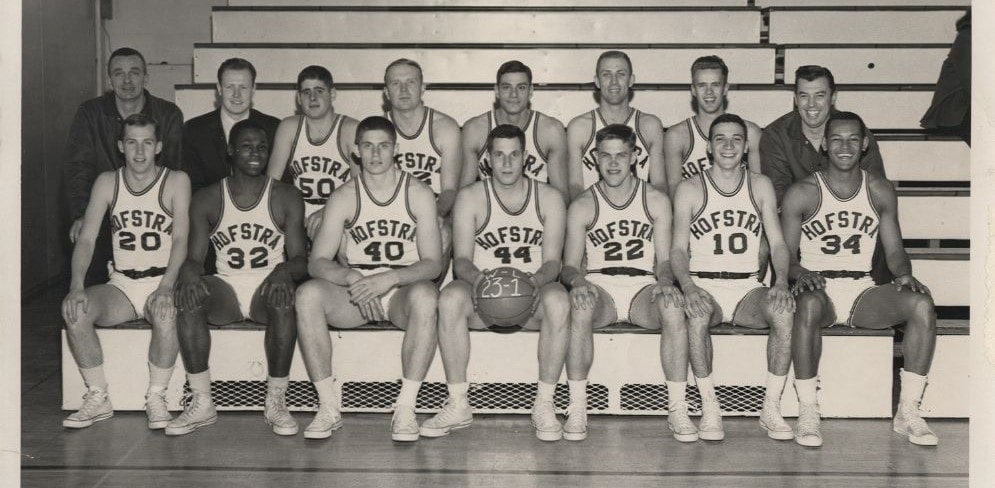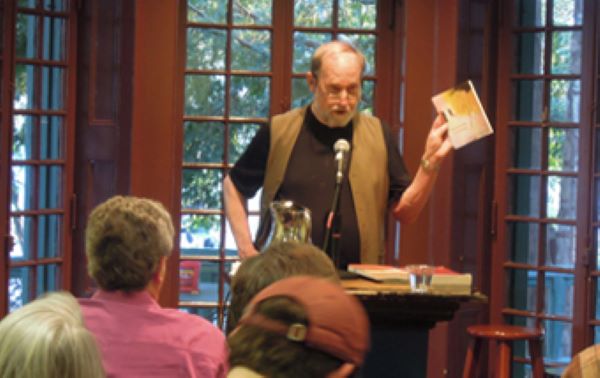|
Long before he won the Pulitzer Prize, Stephen Dunn helped win basketball games.
His soft jump shots from the outside floated into the basket, often enough to earn him the locker-room nickname, “Radar.” His game was soft, gentle. His poetry had the impact of a subtle elbow, making its point. He found himself along the road from the Queens playground to the Hofstra College gym to the gatherings where he read his poems. We watched him soar, higher in poetry than he ever did in basketball, but always one of us, a bunch of Hofstra jocks – student-athletes, actually – plus, one former student publicist who became a journalist. The quiet bloke at our table at Foley’s, the great sports pub, was a big-timer, with the 2001 Pulitzer to prove it, not that he ever brought it up. Radar was always quiet, modest, observant, and accurate. The last time I talked to him, months ago, he allowed as how he was now confined to a wheelchair from Parkinson’s Disease, and his voice was so badly shot that a good friend would have to read his latest work at some Zoom poetry gathering. Then it got worse, and Stephen Dunn died Thursday on his 82nd birthday. Stephen was another advertisement for the Hofstra of the late ‘50s – when Hofstra was stretching from a suburban commuter college, making a pitch for city kids – Francis Coppola from Queens, Lainie Kazan from Brooklyn, Tony Major from Florida and Harlem, and Stephen Dunn from Forest Hills, Queens. Stephen won a starting job as a sophomore, was the second highest scorer, but always quietly, hesitant to roar. He was a first-generation college kid, and did not know how it all worked. But on one of our big-time road trips all the way to Allentown or Gettysburg, he was listening to two older teammates, Sam Toperoff and Dick Pulaski, talking about "Moby-Dick," talking with enthusiasm and insight and opinions. Wow, Radar thought. He began to pay more attention in class, began to work at his writing. That was one epiphany. The other epiphany was next season, matching up with a new player on the team, from a basketball family. “He could block my jump shot. He could steal the ball from me,” Stephen wrote in an essay, “Basketball and Poetry: The Two Richies.” (This lovely essay is in “Walking Light; Essays and Memoirs,” W.W. Norton and Co., 1993.) “No one could free me from Richie Swartz. Richie Swartz turned me inward to where doubts are, and doubts, while good for the poet, are bad for the athlete.” (The “good Richie” was another teammate, Richie Goldstein, who once fed Stephen for 45 points in a Press League game.) When Stephen Dunn was a celebrated poet, he would often read from this essay, and when he was finished lauding Richie Swartz, Stephen would add: “You son of a bitch,” but lovingly. Stephen was still a core player on the 1959-60 team that won 23 games and lost 1, and crushingly was not invited to any post-season tournament. Stephen surprised himself by playing a season in the Eastern League, crowding into a car with more celebrated former college players, for weekends in Williamsport and Sunbury, Scranton and Camden. He was a pro. Then circuitously, he became a poet. Dunn’s life and career are best appreciated in the obituary by Neil Genzlinger, in The New York Times: https://www.nytimes.com/2021/06/25/books/stephen-dunn-poet-dead.html Stephen Dunn lived his final decades in an aerie outside Frostburg, Md., with his wife, Barbara Hurd, also a writer, specializing in nature. They held occasional soirees, with friends from around the region, people who liked to write and read and listen and talk. And his legs gave out, and his voice gave out, and on Thursday, all of him gave out. Happy Birthday, Radar. You can get off your feet, your jumper arching perfectly, into the basket.
Denni D’Oca
6/25/2021 05:42:39 pm
George, what a beautiful tribute about Stephen. You captured the man as I remember him. A gentle giant.
George
6/26/2021 10:39:32 am
Dennis: Thank you. I should footnote this by saying that you were the star lefty, best ERA in the country, in 1960, same year as the 23-1 team with Radar. Both your teams are in the Hofstra Athletic Hallof Fame,.
Gene Palumbo
6/25/2021 09:14:55 pm
I agree with Denni: it's beautiful. Unlike Denni, I didn't know him, but this helps to make up for that. 6/25/2021 09:26:52 pm
Dear George,
Ina Lee Selden
6/26/2021 07:36:21 am
Thanks for introducing us to Stephen Dunn. Your tribute soars and arches so gracefully we can almost see him on the court and from behind a podium.
George
6/26/2021 10:44:33 am
Dear Gene and Altenir and Ina: Thank you for "discovering" Stephen. He has another book coming out next year with a knockout poem, a farewell. TBC. George
Randolph
6/26/2021 01:03:41 pm
George,
Gerard Rosenthal
6/26/2021 02:02:13 pm
George Vecsey
6/26/2021 02:09:00 pm
Jerry Rosenthal was a teammate of Dennis D'Oca on that great baseball team and then played two years in the minors. I wrote about him last year
Lew Freifeld
6/26/2021 02:26:49 pm
I am so deeply saddened to hear about "RADAR'S" passing. His wispy blond hair was always flying about when he was dribbling or taking a long jump shot which at least 40% plus went in. He was a true scholar athlete who used his Athletic skills to get to what he really wanted to do: Pulitzer Prize winning POET.
George Vecsey
6/26/2021 02:38:57 pm
Lew, thanks. You overlapped with Stephen....point guard from Richie Swartz to Steve Nisenson. I will point out that you were also all-city at Erasmus Hall, setting up that talented sophomore, Billy Cunningham.
Angela McKenzie
6/26/2021 06:53:04 pm
George, I love when you write these stories about people you know and admire. Stories like these remind me of why as a young girl growing up in the Caribbean, I fell in love with Americans. Americans like these are indeed the people who I read about back then, talented, noble, kind, brave, smart, adventurous. It has been one of life's greatest pleasure to meet some of these fine folks, such as a number of WWII vets from the sub tender Pelius (Charles' uncle Bing being one), and of course people like you and Marianne. Thanks for sharing this story. Many of you made America a beacon of hope for the rest of us. Alas, these days, not sure how long the flame will hold, but hope springs eternal!
Ed Martin
6/26/2021 08:02:23 pm
As always, you write about humanity. Thanks for introducing us to Stephen/Radar. RIP. 6/27/2021 01:41:20 pm
Stephen Dunn once wrote, “What basketball and poetry have in common is that they each provide opportunities to be better than yourself — opportunities for transcendence.”' R.I.P. Stephen.
Gene Palumbo
6/27/2021 08:31:59 pm
In one of the comments above, George provided the link for his earlier column about Jerry Rosenthal. I just went back and reread it -- and strongly recommend it to you all. https://www.georgevecsey.com/home/my-friend-out-hit-lou-brock-in-six-games
Brant Alyea
6/27/2021 08:39:58 pm
George, you wrote a beautiful tribute to Stevie. Stevie was a terrific player and a great teammate. We will miss him.
George
6/27/2021 08:55:53 pm
Brant thank you. Hope all is well. GV
Alan Rubin
6/28/2021 10:27:05 am
A wonderful tribute! There seems to be something in the drinking water when it comes to shooting guards from your past. First Tony Fauci and now Stephen Dunn.
bruce
6/29/2021 12:02:47 pm
george,
Peter F. Habein
6/30/2021 04:07:20 pm
George, having not heard of or from my friend Alan Taxerman for a very long time, and apropos of the Yankees' weekend in Boston, I thought I would try to reach him. But my email went unanswered, and that prompted me to check the web only to find your moving remembrance on Al's passing in 2018. I am so sorry that I didn't know he was gone. Al and I met in the early '90's when I was representing NYL in Montana. I invited Al to fire me when we butted heads over strategy, and that was the beginning of a beautiful friendship, many trips to the Palm (we took turns buying, I always ordered the "lob" and Al always ordered me at least one more gin than I needed) and to Yankee Stadium over the course of more than a decade. I knew he had been ill for a time but didn't want to pry, and I knew in turn how much he treasured his friendship with you. Anyway, thank you for capturing so well the Al I knew and will remember.
George
7/1/2021 10:50:10 am
Dear Mr. Habein: Thank you for the note -- appropriately enough on my farewell to another Queens high school basketball player and Hofstra grad. Stephen Dunn was a poet from Forest Hills; Big Al was a lawyer from Van Buren HS. You had the same relationship with Big Al that I did. He must have fired me, or busted me, a hundred times because I did not show ultimate respect for The Mick. And what about his emails, out of nowhere, to me, a Don Newcombe fan and friend, "What do you think your pal Newk dreams about -- maybe Yoggalah?"
bruce
7/1/2021 11:05:07 am
george, Comments are closed.
|
Categories
All
|











